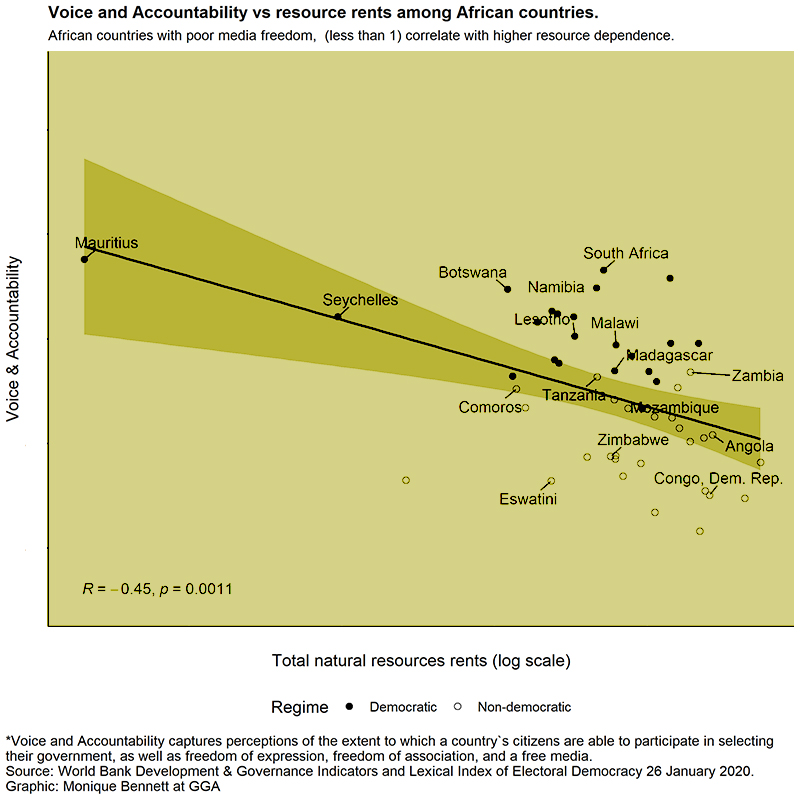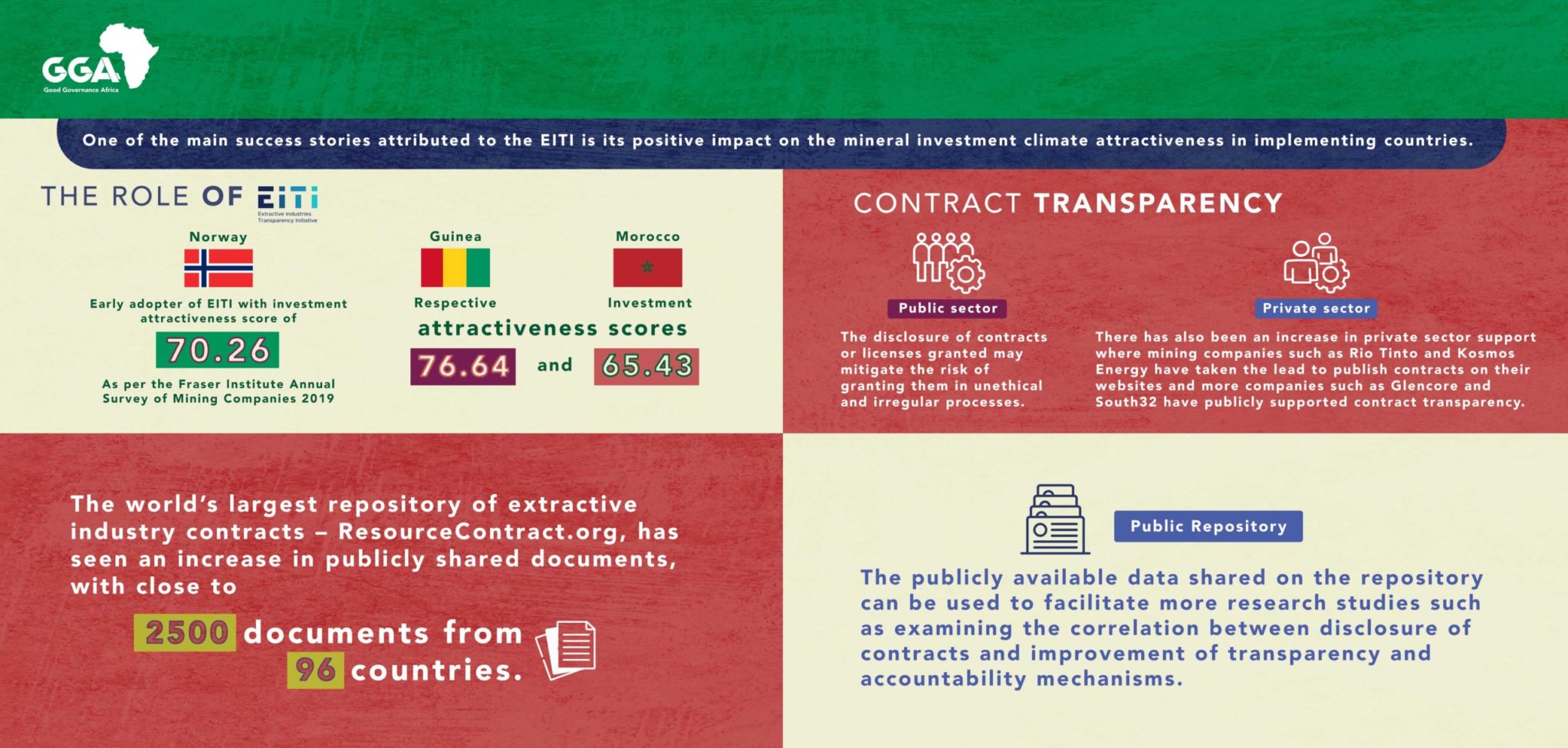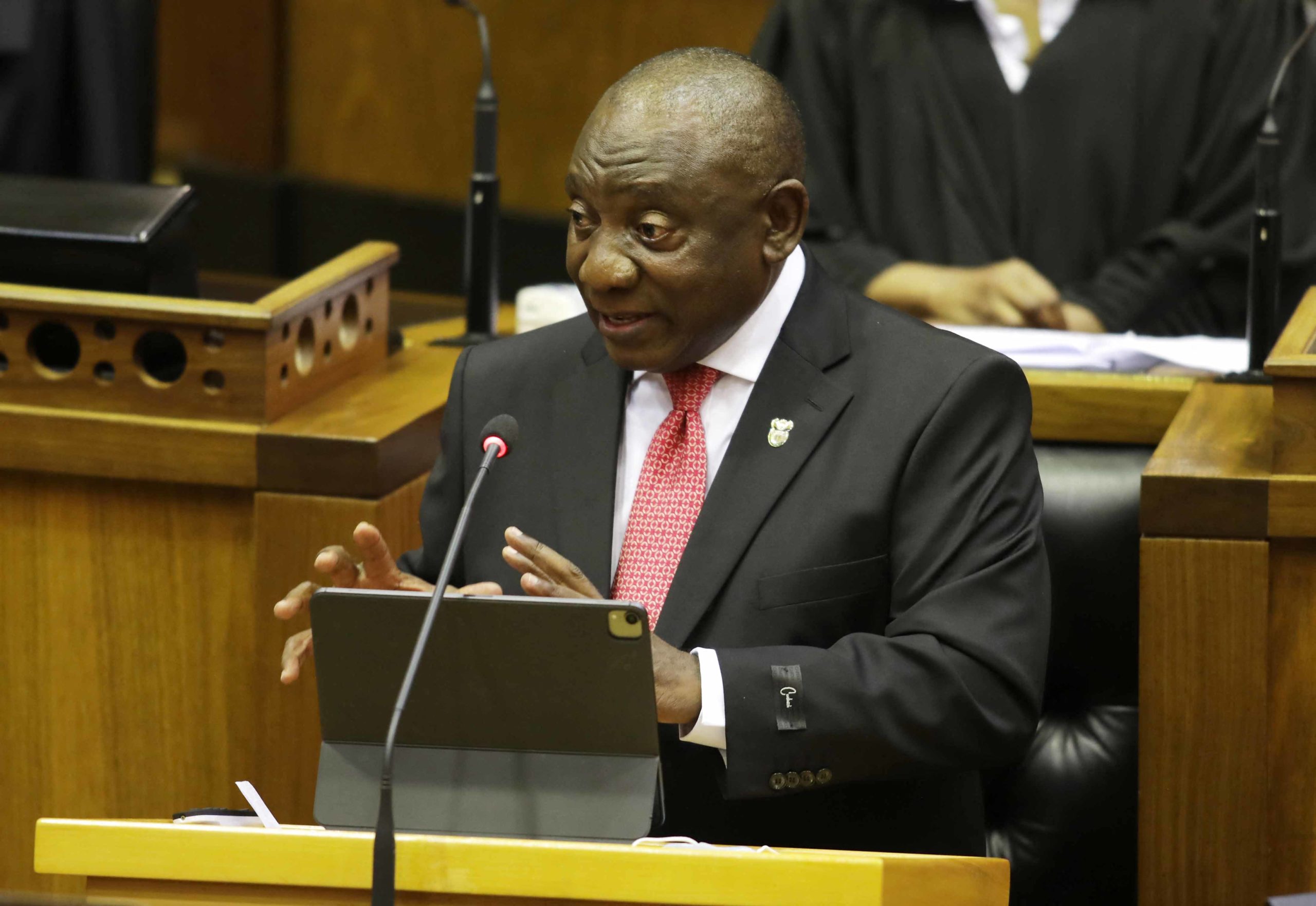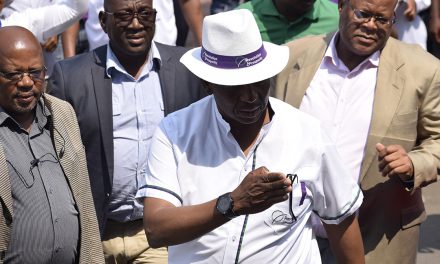Click here for the PDF version of this Policy Briefing.
Recommendations
- The Extractive Industries Transparency Initiative (EITI) Secretariat should take the lead in developing intervention mechanisms that ensure a strong civil society representation in the multi-stakeholder groups, to enable real public participation and obtain local legitimacy of the Initiative:
-
- This can be done through actively identifying and partnering with relevant grassroot civil society organisations that work directly with mining-affected communities.
-
- Implementing countries should work more collaboratively with the EITI to investigate any reported revenue discrepancies highlighted in the country-specific EITI reporting:
-
- This can be enforced by implementing countries in alignment with their guiding principles of regulatory bodies and the national EITI Multi-Stakeholder Group (MSG) in the effort to fight against corruption and ensure local ownership of the EITI process.
-
Introduction
The Extractives Industries Transparency Initiative (EITI), founded in 2003, was formed as a tool to improve and promote transparency in the oil and gas, and mining sectors, respectively. It was primarily designed to overcome the challenge of revenues in the extractive industries being diverted for unproductive purposes and therefore not being properly accounted for. A lack of transparency means that one of the primary and necessary conditions for accountability cannot be met. In the absence of accountability, corruption proliferates, placing wealth in the hands of the ruling elite at the expense of broad-based development. While transparency is necessary, it is not sufficient for real accountability. Nonetheless, it is a critical first step. The EITI has become the global standard for transparency in the extractives sector. However, debate over its success continues.
This briefing examines the key contributing factors that have undermined the potential value of the EITI, and sets out recommendations on how the initiative can be utilised to meaningfully improve transparency and accountability, particularly in mineral wealthy but fragile mining contexts. With the 27th annual Investing in African Mining Indaba on the horizon, it is critical to assess how mining codes and international agreements such as the EITI can gain more traction and impact on the ground.
Contextualising the resource curse and institutions curse
The EITI promotes the emergence of global transparency and resource governance initiatives developed to partly reverse the resource curse but beyond that, it seeks to address poor governance and grand corruption in mineral-wealthy countries.[1] Fundamentally, the resource curse is the hypothesised negative impact of a country’s natural resource wealth on its economic, social, or political wellbeing.[2] Many scholars have contributed to the academic literature unpacking the nature of this relationship between mineral extraction and economic growth in resource-rich countries, both from economic and political perspectives.
Rent-seeking and patronage have been identified as the key mechanisms in how the resource curse operates.[3] Standard political economy models maintain that resource rents accrue to elites, who then distribute those rents to their political supporters (patronage). These dynamics have therefore become critical in understanding the roots of the resource curse.[4] Rent-seeking limits the incentives for ruling elites to broaden the tax base by diversifying the economy and respecting property rights. Without a broad tax base with which to hold the government to account, accountability is eroded.[5] Consequently, corruption – rooted in rent-seeking conduct and creation of patronage pathways – becomes entrenched, and perpetuates underdevelopment for many resource-rich African countries.[6]
By 2006, a relative consensus had developed in the literature that the quality of a country’s institutions was a key mediating variable accounting for why some resource wealthy countries have thrived but most have floundered. If a country fails to build robust institutions before natural resource wealth arrives, it is likely to suffer the resource curse. Early scholarship on the subject – of the existence of an institutions curse – contends that when institutions are poorly managed, rent appropriation dominates the political settlement, which diminishes transparency. In turn, this heightens bureaucratic corruption and leads to weak protection of property and citizens’ rights.[7] The development of robust political institutions is, therefore, a critical component of ensuring accountability and that resource-rich countries benefit more broadly and sustainably from their mineral wealth.[8]
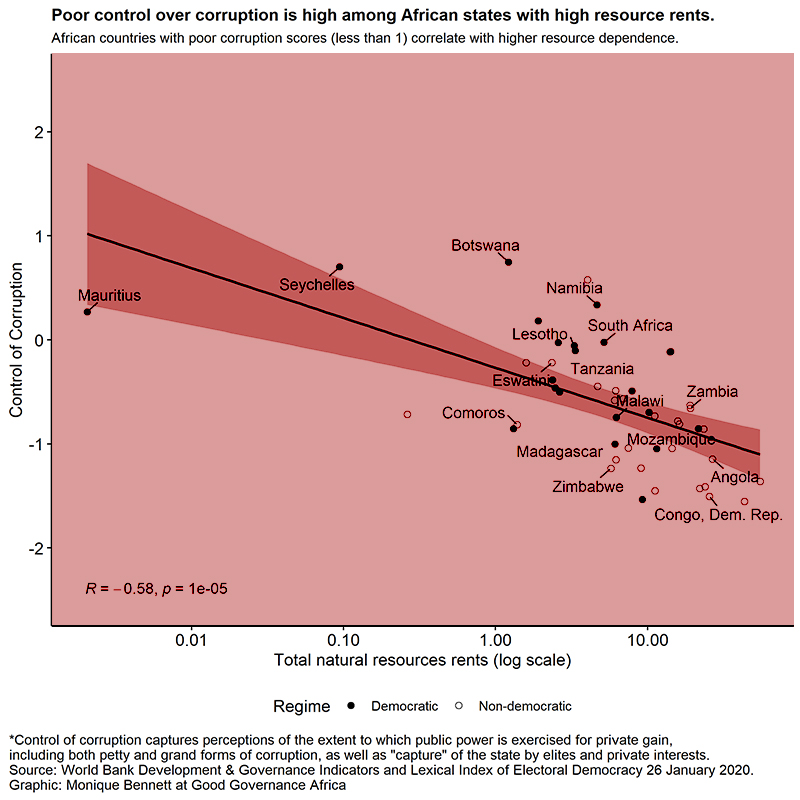 .
.
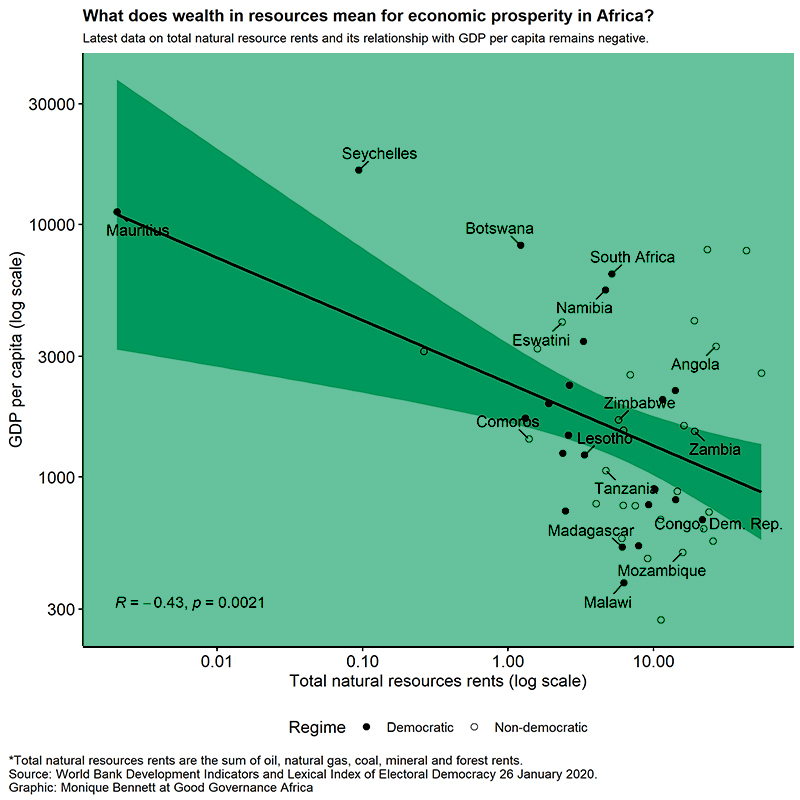
The establishment of the EITI
Launched in 2003, the EITI was originally proposed as British foreign policy under then-Prime Minister Tony Blair’s International Development ministry, at the World Summit on Sustainable Development in 2002. It was a key part of the global consensus to persuade the extractive industries to become more transparent and promote better governance by disclosure.[9] The EITI is a voluntary global standard that promotes the open and accountable management of oil, gas and mineral resources.[10] Accession to the EITI is a government-led process that encourages governments to join the Initiative on a voluntary basis[11] by following the EITI standard that “requires the disclosure of information along the extractive industry value chain from the extraction, to how revenues make their way through the government, and how they benefit the public.”[12]
The EITI is implemented by 55 countries at present and is supported by governments, companies, and civil society, respectively. The EITI board consists of 20 members who are responsible for providing oversight to the participating countries and for evaluating countries’ performance in reaching the requirements of the EITI standard.[13] In Africa, the EITI has 26 member countries and it focuses on disclosing data, straightening governance and fighting corruption.[14] In addition, it aims to prioritise issues related to domestic resource mobilisation from extractives, licensing, beneficial ownership, state-owned enterprises and commodity trading transparency.[15]
The EITI Multi-Stakeholder Groups (‘MSGs’) are responsible for overseeing the implementation process of the EITI and ensuring engagement from government, industry and civil society.[16] The MSG may consist of representatives from government agencies, trade unions, parliamentarians, private sector, civil society, and media.[17] This multi-stakeholder oversight requires an agreed work plan with clear objectives for EITI implementation, alongside a timetable aligned with the deadlines by the EITI Board.[18] For the MSG to successfully achieve its mandate, it needs to be legitimate and effective and be able to provide accountability.[19] For example, the Liberia Extractive Industries Transparency Initiative (LEITI) failed to publish the EITI Reports for 2016/17 & 2017/18, 2019 Annual Work Plan, and 2017/18 Annual Progress Report which resulted in a temporary suspension on Liberia by the EITI Board.[20] The LEITI MSG then played a critical role in ensuring that the temporary suspension placed on Liberia was lifted. This avoided the country being delisted from the EITI due to its failure to publish the abovementioned reports.[21] The LEITI MSG took critical action to address the challenges facing the EITI implementation in Liberia by recruiting a technical consultant, and appointed an officer-in-charge to support the MSG to complete all outstanding reports.[22]
The role of EITI
One of the main success stories attributed to the EITI is its positive impact on the mineral investment climate attractiveness in implementing countries[23]. Resultantly, countries have a strong incentive to join the EITI to improve their reputation and reduce the perceived risk of investing in their mineral sector.[24] For example, Norway was an early adopter of the EITI and its investment attractiveness score is 70.26 as indicated in the Fraser Institute Annual Survey of Mining Companies 2019. Other EITI country members are Guinea and Mexico and their respective investment attractiveness scores are 76.64 and 65.43.[25]
More recently, the EITI has organised a Contract Transparency Week which aims to assist EITI-implementing countries undertake reforms to disclose contracts. This renewed drive has seen progress on public contract transparency over the last two years, which includes the requirement for member countries to disclose all contracts or licenses granted, entered, or amended from 1 January 2021.[26] The disclosure of contracts or licenses granted may mitigate the risk of granting them in unethical and irregular processes as seen in the South African case of Imperial Crown Trading and Kumba Iron Ore Company, wherein mining rights were granted through political ties.[27] There has also been an increase in private sector support where mining companies such as Rio Tinto and Kosmos Energy have taken the lead to publish contracts on their websites and more companies such as Glencore and South32 have publicly supported contract transparency.[28]
In addition, the world’s largest repository of extractive industry contracts – ResourceContract.org, has seen an increase in publicly shared documents, with close to 2500 documents from 96 countries.[29] This is a step in the right direction, and should lead to other key industry players joining in on improving contract transparency and in turn developing accountability mechanisms where discrepancies are identified. Moreover, the publicly available data shared on the repository can be used to facilitate more research studies such as examining the correlation between disclosure of contracts and improvement of transparency and accountability mechanisms.
Challenges
Undoubtedly, the EITI has great potential to shift the governance needle when it comes to working towards improving transparency in the extractives sector. However, many scholars have debated the success of the EITI and have questioned its impact around achieving societal change and development in resource-rich countries.
Resource-rich countries are not obliged to join the EITI and therefore are not required to comply to the global standards of transparency set out by the Initiative. Moreover, member countries that have not met the EITI requirements are suspended and therefore face no obvious consequences upon failure to meet the requirements.[30]
The second key contributing factor has been the lack of a strong civil society representation in the capacity of providing oversight, monitoring and participation in MSGs.[31] In reality, the role of civil society has been severely undermined and has been limited and hindered by intimidation from governments. In Azerbaijan, for instance, the government limited the operation of civil society organisations and increased their operating risks through fear of being shut down. As a result, Azerbaijan was suspended from the EITI because it failed to enable civil society engagement.[32] Without a strong civil society representation in MSGs, the EITI will be limited in being utilised as a tool to improve transparency and fight against corruption.
A final key contributing factor covered in this briefing is the inability of the EITI to prevent corruption.[33] While the EITI has made significant efforts to promote transparency in respective contexts, the challenge remains to further develop and strengthen accountability mechanisms. With the lack of accountability, no real consequences can be imposed to prevent and deter corruption. For example, in 2008, Zambia’s first EITI report revealed that mining companies forwarded USD 463 million in payments to the government, claiming “significant discrepancies” and further noting a net total of “unresolved discrepancies” of USD 66 million.[34] It also states that the EITI “does not focus on what multinationals ought to have paid, only what they have paid, and it never investigates the means through which corporations were able to circumvent taxation”.[35] It is understood that the EITI is not an investigative body and countries may need to build complementary mechanisms that can investigate and prosecute corruption through using EITI reports.
Conclusion
The EITI has great potential to significantly improve transparency in the oil, gas and minerals sectors, particularly in ensuring the disclosure of contracts and licenses granted to oil and gas and mining companies. However, as briefed above, transparency in itself is insufficient to address the resource curse, let alone the institutions curse. The founding principles of many mining codes and international agreements look feasible on paper, and the EITI is among the more credible. However, these codes are often at odds with their ideals, and for various reasons, fail to gain traction in a way that results in sustainable broad-based development. Collaborative effort is now required between countries and the EITI to ensure that governments, civil society and the EITI work more cohesively to build institutional mechanisms that will help countries move from mere transparency to real accountability.
[1] Gillies, A & Heuty, A. (2011). Does transparency work? The challenges of measurement and effectiveness in resource-rich countries. Yale Journal of International Affairs. 25-42.
[2] Ross, M.L. (2015). “What Have We learned about the Resource Curse?”, Annual Review Political Science. 18, 239-59.
[3] Williams, A. (2009). “On the release of information by governments: Causes and consequences.”, Journal of Development Economics. 89, 124-138.
[4] Kolstad, I & Wiig, A. (2009a). It’s the rents, stupid! The political economy of the resource curse. Energy Policy. 37, 5317-5325.
[5] Herb, M. (2005). No representation without taxation? Rents, Development and Democracy. Comparative Politics, Vol. 37 3,297-316.
[6] Kolstad, I & Wiig, A. (2009a). It’s the rents, stupid! The political economy of the resource curse. Energy Policy. 37, 5317-5325.
[7] Mehlum, H., Moene, K & Torvik, R. (2006a). Institutions and the resource curse. The Economic Journal. 116(508), 1-20.
[8] Robinson, J.A., Torvik, R. & Verdier, T. (2006). Political foundations of the resource curse. Political Journal of Development Economics. 79, 447-468.
[9] Sovacool, B., Walter., G van de Graff & Andrews, N. (2016). Energy governance, transnational rules, and the resource curse: exploring the effectives of the Extractives Industries Transparency Initiative (EITI). World Development. 83, 179-192.
[10] Extractive Industries Transparency Initiatives. (2020). Retrieved from: https://eiti.org/who-we-are
[11] Wilson, E. & Van Alstine, J. (2014). Localising transparency: Exploring EITI’s contribution to sustainable development. International Institute for Environment and Development. London.
[12] Extractive Industries Transparency Initiatives. (2020). Retrieved from: https://eiti.org/who-we-are.
[13] Extractive Industries Transparency Initiatives. (2020). Retrieved from: https://eiti.org/about/board.
[14] Extractive Industries Transparency Initiatives. (2020). Retrieved from: https://eiti.org/news/uganda-joins-eiti.
[15] Ibid.
[16] Extractive Industries Transparency Initiatives. (2020). Retrieved from: https://eiti.org/document/eiti-standard-2019#download.
[17] Ibid.
[18] Ibid.
[19] Magnoa, C & Gatmatyan, D. (2017). Corruption and civic space: Contextual factors influencing EITI compliance. The Extractives Industries and Society. 4, 806-815.
[20] Harmon, W.Q. (2020). EITI Lifts Ban on Liberia. Daily Observer.
[21] Harmon, W.Q. (2020). EITI Lifts Ban on Liberia. Daily Observer.
[22] Ibid.
[23] Malden, A. (2017). A safer bet? Evaluating the effects of the Extractive Industries Transparency Initiative on mineral investment climate. The Extractive Industries and Society. 4, 788-798.
[24] Sovacool, B., Walter., G van de Graff & Andrews, N. (2016). Energy governance, transnational rules, and the resource curse: exploring the effectives of the Extractives Industries Transparency Initiative (EITI). World Development. 83, 179-192.
[25] Stedman, A, Yunis, J and Aliakbari E. (2020). Fraser Institute Annual Survey of Mining Companies 2019. Retrieved from: https://www.fraserinstitute.org/sites/default/files/annual-survey-of-mining-companies-2019.pdf.
[26] Pitman, R. (2020). Contract Transparency is an Extractive Industries Success Story – But It’s Not Over Yet.
[27] Mail & Guardian, (2011). “Everything you wanted to know about the Sishen row.” Mail & Guardian.
[28] Pitman, R. (2020). Contract Transparency is an Extractive Industries Success Story – But It’s Not Over Yet.
[29] Ibid.
[30] Extractive Industries Transparency Initiative. (2020). Retrieved from: https://eiti.org/countries.
[31] Alstine, J. (2014). Transparency in resource governance: the pitfalls and potential of “New Oil” in Sub-Saharan Africa. Global Environmental Politics. 14(1), 20-39.
[32] Extractive Industries Transparency Initiative. (2017). Retrieved from: https://eiti.org/news/azerbaijan-withdraws-from-eiti.
[33] Corrigan, C.C. (2014). Breaking the resource curse: Transparency in the natural resource sector and the Extractive Industries Transparency Initiative. Resources Policy. 40, 17-30.
[34] Sharife, K. (2011). ‘Transparency’ hides Zambia’s lost billion. Aljazeera.
[35] Ibid.
Busisipho Siyobi is the Programme Head of the Natural Resource Governance Programme at GGA. Prior to joining GGA, she headed up the Corporate Intelligence Monitor desk at S-RM Intelligence and Risk Consulting. Busisipho holds an MPhil in Public Policy and Administration from the University of Cape Town with a research focus on CSR within the South African mining industry. During her Masters, she worked as a research scholar at the South African Institute of International Affairs.


